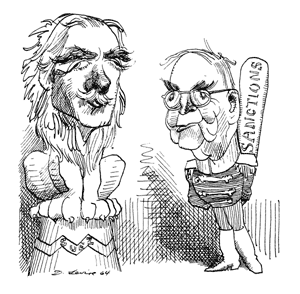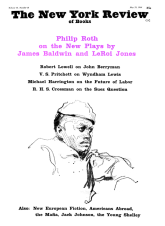As an Opposition back-bencher, I was only the most minor of participants; yet the Suez crisis—with its days of savage uproar in the Commons, its monster demonstrations in Trafalgar Square, and its macabre background of Hungarian tragedy—was the most searing experience of my whole political life. Today, less than eight years later, the episode has receded into history. Here in Britain we politicians can placidly look back at this traumatic experience and re-examine it with something approaching clinical detachment.
In doing so, it is almost impossible to avoid the smoothest-worn clichés of the professional historian. If the Suez venture was not “a watershed” (we crossed that sometime in the course of World War II) it was certainly a “moment of truth” when it was suddenly and overwhelmingly born in upon every British politician—whether he was supporting Sir Anthony Eden or opposing him—that the United States was the boss in the Western Alliance and that we were living in a country which could no longer “go it alone.”
Of course, the withdrawal from Port Said was not the cause of the collapse of the British and French African Empires that immediately followed it. What it did was to sound an imperial death knell so loud and sinister that Harold Macmillan and Charles de Gaulle were driven to liquidate what each had pledged himself with fanatical conviction to defend. Within four years, Mr. Macmillan as Prime Minister was proclaiming in his “wind of change” speech the decision to wind up as quickly as possible that White African empire which, in 1956, he had been urging Anthony Eden to sustain, if necessary by force of arms. Within six years, General de Gaulle conceded that total withdrawal from Algeria which Guy Mollet thought he could avoid by allying himself with the Israeli in order to topple Nasser.
If the Anglo-French venture taught us our military and economic weakness vis-à-vis America—it took Mr. Eisenhower exactly three days of oil and financial sanctions to bring the British and French Governments to heel—it also shook us out of a mood of backward-looking nostalgia for a past imperial greatness, and made us reconsider the whole basis of our existence as independent nations and also as members of NATO.
Indeed, it is no exaggeration to say that, apart from the tragedy of one man, Lord Avon, the Suez fiasco in retrospect can be seen as a disguised blessing to the whole Western Alliance. And if none of us feels much gratitude either to Mr. Eisenhower and Mr. Dulles, or to Lord Avon and M. Mollet, for the roles they played, this is because it is now so obvious that none of them was in control of the situation. This was a crisis precipitated by blindness and incompetence, in which none of the participants, with the possible exception of Colonel Nasser, rose to his appointment with destiny. Instead, each of the four Western protagonists remained stiffly and stubbornly true to type, the victim of his worst characteristics. If there is a great deal for which we can be thankful in the Suez affair, there is little in which we can take pride—which perhaps explains why it has ceased to be current politics and become a topic for investigation by the academic historian.
And the historians have not taken long to get down to the job. Here, for example, are three serious books by academics, two of them determined to treat the Suez affair in terms not of political controversy but as objective history.
Mr James Eayrs, of Toronto University modestly offers us what he describes as “a documentary survey” of how the Commonwealth reacted to the Suez crisis. Well over half of his study is taken up with extracts from the relevant speeches and documents which demonstrate the rift Lord Avon drove between the old White dominions on the one side, and the new independent Asian Commonwealth members on the other. But to each chapter he has added a few pages of explanatory narrative which seem to me to contain as judicious an account as anything we are likely to get for many a year.
Mr. Epstein, Professor of Political History at Wisconsin, made a considerable name for himself—in my country at least—with his Britain—Uneasy Ally. In his detailed analysis of political opinion, he showed a quite uncanny skill at getting inside the British skin and describing our real feelings towards the U.S.A. In British Politics in the Suez Crisis, he continues this specialist study of British party politics and has given us what will surely be accepted as the definitive account of how the Suez crisis affected both the British Parliament and the party machines outside.
From their vantage points across the Atlantic, both these historians are able to view our British politics with detachment; and it is interesting to observe how far they confirm the view that, by turning on their allies and forcing a withdrawal, Eisenhower and Dulles dragged us back from the edge of catastrophe. Indeed, it is clear enough from their accounts that, if the United States had connived at a Franco-British “victory,” the result would have been not merely to throw the whole Arab world into the arms of Russia but to disintegrate the Commonwealth, and incidentally to produce a near breakdown of British democracy.
Advertisement
For the real danger that faced the West was not the threat of Russian intervention (was that not a bluff produced when the Kremlin knew that it would not be called?) but the probability that victory in the Canal would commit Britain and France to an occupation of Egypt from which it would have been impossible to withdraw, except after military defeat. It was from this risk that we were delivered by the combination of lke’s simple-mindedness and Dulles’s tortuous pedantry.
Anyone, however, who imagines that this assessment of the Suez affair is uncontested should take a look at Dulles over Suez. In this enormous volume, Herman Finer tries to prove that if only John Foster Dulles had not frustrated them, Lord Avon and M. Mollet could have toppled Nasser, regained control of the Canal, and taught the Russians far more effectively in 1956, the lesson Mr. Kennedy brought home to them over Cuba seven years later.
According to the publishers’ blurb, Professor Finer “spent over two years traveling through the U.S., Europe and the Middle East in order to gather evidence from documentary sources and from personal interviews with over fifty of the world’s major leaders involved in the Suez crisis.” On the basis of the material he collected, he has composed a day-by-day, and sometimes hour-by-hour, narrative of the Suez crisis to which he has appended what he calls “a summing up.” But there is nothing judicial either in the tone or in the content of this sprawling, sputtering, absorbing book. Professor Finer has put John Foster Dulles in the dock and allotted to himself the role, not of judge or of jury, but of Public Prosecutor at the court of history. Indeed the hectoring style in which he addresses the reader, and the violent partisanship with which he treats the large amount of first-hand information he has garnered, sometimes gave me the feeling that I was back in the House of Commons eight years ago, listening to the loquacious arguments of a more than usually anti-American Conservative back-bencher.
Yet the facts, as a careful comparison of these three books makes clear, are no longer in dispute. As soon as Nasser seized the Canal, the British Government informed the Americans that he could only be ousted by force of arms, and began to concert military plans with the French Government, already in alliance with Israel. If Mollet and Ben-Gurion could have had their way, the attack would have been launched much earlier and remorselessly driven home. It was Lord Avon’s special role to persuade them that negotiations and recourse to the United Nations must be tried and proved useless before the attack took place.
Eisenhower and Dulles saw nearly as clearly as Eden and Mollet that there was no chance whatsoever of persuading Nasser to restore the Canal to international control. But unlike their allies, they were convinced that Egyptian national control of Suez was a far lesser evil than a Franco-British attempt to recapture it by force. Mr. Dulles, therefore, was charged with a task that exactly suited his talents—the use of negotiation in order to postpone the military attack until the heat was out of the crisis, and action became impossible. Subjectively, he was on the side of the British and the French; objectively, he was keeping Nasser in power. Dulles was very clever—but not quite clever enough. Exasperated by his prevarications, the French finally persuaded the British Government to tolerate an Israeli attack launched under French air cover, and a smoke-screen of outright lying.
All these facts are to be found in Professor Finer’s book. But the picture he has composed out of them is a caricature. On the one side, stands a vile hypocritical American Secretary of State, and on the other a noble honest British statesman. In order to achieve this black and white contrast, every statement of Mr. Dulles is carefully analyzed and every tiny ambiguity exposed as deceitful, while Lord Avon’s long succession of evasive deceptions and broken promises are discreetly pushed under the carpet. Indeed, in a remarkable chapter on the Sinai campaign the Labour Opposition is accused of stupidity because it charged Lord Avon with collusion. “Such a charge is stupid.” we are told, because “the issue is not collusion but the expediency of a war in which collusion is a useful instrument.” Since Lord Avon consistently denied the charge of collusion, Professor Finer by this defense of the British Government, convicts his hero of cold-blooded lying, not only to the Americans, but to the Commonwealth Governments and to the British Parliament—not to mention his Cabinet colleagues.
Advertisement
When he comes to consider what happened after the attack on Egypt was launched, Professor Finer’s condemnation of Mr. Dulles is even more severe. Here he adds to hypocrisy and dishonesty the new charge of cowardice. The President and the Secretary of State, we are informed, were so scared by the Russian threats that they lost their heads, and in a panic attempt to prevent a clash in the Middle East imposed sanctions on the British and the French in order to enforce an immediate withdrawal.
Here is one of the few important points of the Suez story where the facts are not yet clear. If he were acting not as prosecutor but as judge, the author of Dulles Over Suez could have given this as one possible explanation of American policy: but in that case he would have warned his readers that there is not yet sufficient evidence to sustain the charge.
Professor Finer has two virtues which political scientists and historians often lack. He has a real talent for putting himself into the situation he is describing and breathing life into a dead controversy—and he is also not afraid of taking sides. But he seems to me to be extraordinarily deficient in two other essential qualities—the ability to modify his prejudices as the result of reflection on the past, and the fairness of mind which historical hindsight should bring. If it had been published in 1958. I would have praised Dulles Over Suez as a brilliant American counterpart to Randolph Churchill’s rumbustious study of Anthony Eden. Offered to us in 1964, as a serious and considered judgment on American foreign policy, this elephantine pamphlet just won’t do.
This Issue
May 28, 1964




